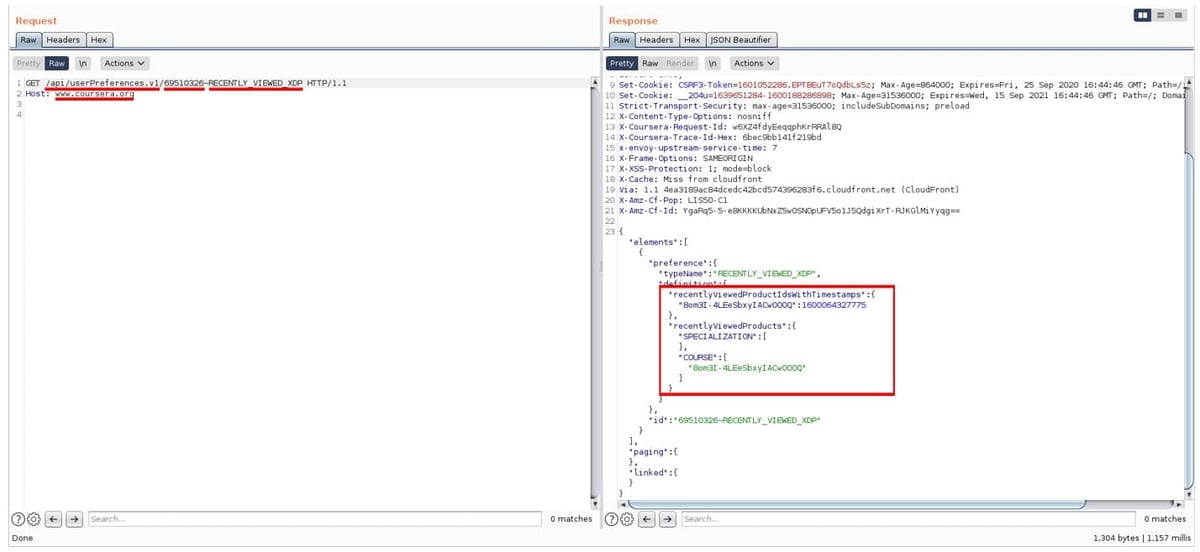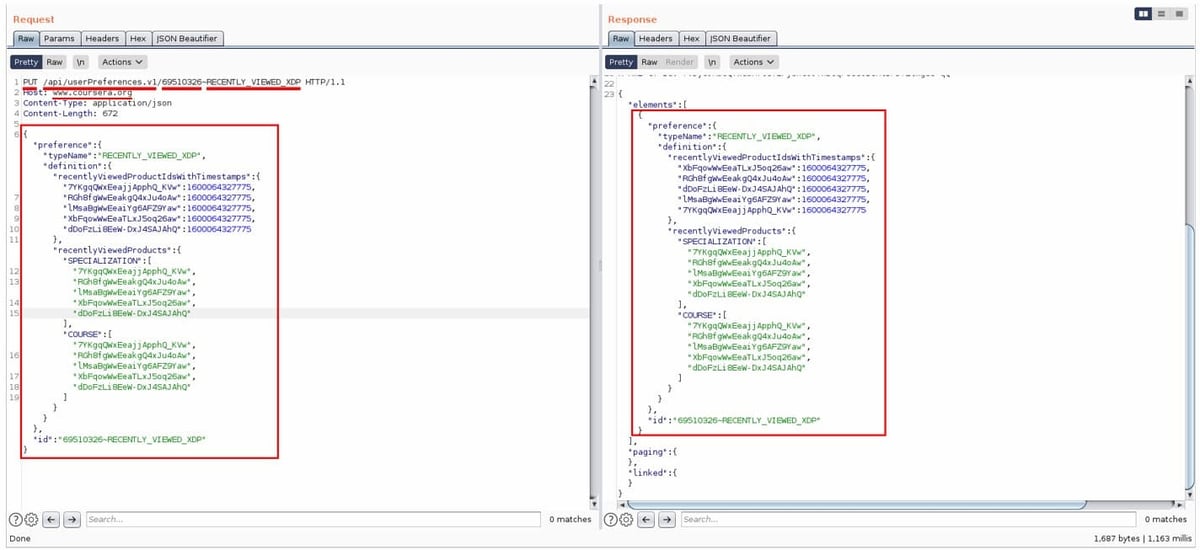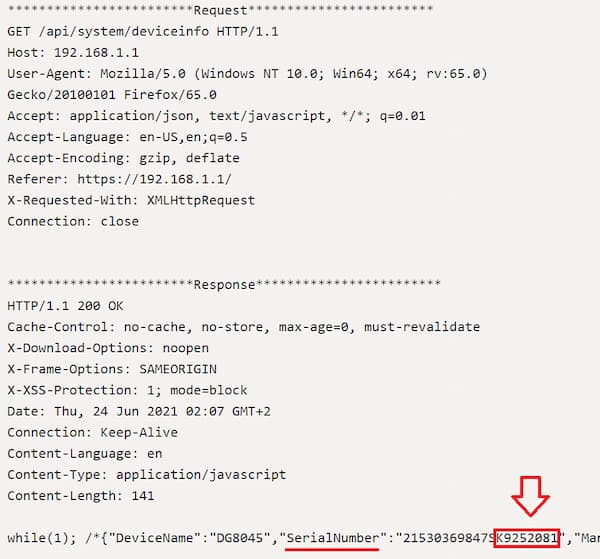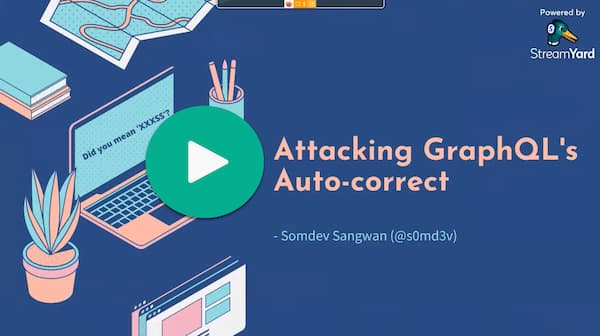Issue 142: API vulnerabilities in Coursera and Huawei, GraphQL rate limiting and discovery 🔎
|
|||||||||||||||||||||||||||||||||||||||||||||||||||||||||||||||||||||||||||||||||||||||||||||||||||||||||||||||||||||||||||||||||||||||||||||||||||||||||||||||||||||||||||||||||||||||||||||||||||||||||||||||||||||||||||||||||||||||||||||||||||||||||||||||||||||||||||||||||||||||||||||||||||||
Older messages
Issue 141: API vulnerabilities in VeryFitPro and Gettr, AWS Lambda authorizers, AsyncAPI 2.1 🏅
Saturday, July 10, 2021
Hi, today we have a few recent API vulnerability case studies, a research on possible implementation flaws in AWS Lambda Authorizers, and the APIsecurity.io The Latest API Security News,
Issue 140: API vulnerabilities at LazyPay, Western Digital, and LinkedIn; IDOR mindmap 🗺️
Thursday, July 1, 2021
Hi, today we look at LinkedIn data getting scraped and WD NAS devices wiped, the recent LazyPay API flaw and an IDOR/BOLA pentesting mindmap APIsecurity.io The Latest API Security News, Vulnerabilities
Issue 139: API vulnerabilities at Apple, Amazon, and 1Sambayan, upcoming Gartner webinar
Thursday, June 24, 2021
Hi, this week we look at the details of 3 recently reported API vulnerabilities and an upcoming free webinar from Gartner APIsecurity.io The Latest API Security News, Vulnerabilities and Best Practices
Issue 138: Vulnerabilities in Microsoft Teams and Instagram
Thursday, June 17, 2021
Hi, this week in our newsletter we look at a couple of recent vulnerability reports, awesome-apisecurity repo, and upcoming DevSecCon24. APIsecurity.io The Latest API Security News, Vulnerabilities and
Issue 137: Vulnerabilities in VMware vCenter and Apache Pulsar, GraphQL and CSRF attacks
Thursday, June 10, 2021
Hi, today we look at a couple of recent API vulnerabilities, API Security in Postman, CSRF and GraphQL, my upcoming live Q&A, and a buyer's APIsecurity.io The Latest API Security News,
You Might Also Like
🔐 Why Microsoft Replacing Passwords Is a Good Thing — Linux Mint vs. Ubuntu
Thursday, December 26, 2024
Also: How I Used QR Codes and Google Sheets to Organize My Home How-To Geek Logo December 26, 2024 Did You Know A "moment" used to be an actual measure of time, corresponding to roughly 90
Ranked | The World's 10 Largest Companies by Revenue (2019-2024) 💰
Thursday, December 26, 2024
We show the world's largest companies by revenue, based on the Fortune Global 500 rankings as stock markets rally in 2024. View Online | Subscribe | Download Our App FEATURED STORY The World's
Issue 345 - OTA software updates are amazing
Thursday, December 26, 2024
View this email in your browser If you are just now finding out about Tesletter, you can subscribe here! If you already know Tesletter and want to support us, check out our Patreon page Issue 345 - OTA
Do Honeypots Still Matter?
Thursday, December 26, 2024
Top Tech Content sent at Noon! Boost Your Article on HackerNoon for $159.99! Read this email in your browser How are you, @newsletterest1? 🪐 What's happening in tech today, December 26, 2024? The
Best Practices for Composition Patterns in Jetpack Compose
Thursday, December 26, 2024
View in browser 🔖 Articles Best Practices for Composition Patterns in Jetpack Compose Jetpack Compose is a newly introduced declarative UI framework compared to other declarative UIs, and there hasn
wpmail.me issue#699
Thursday, December 26, 2024
wpMail.me wpmail.me issue#699 - The weekly WordPress newsletter. No spam, no nonsense. - December 26, 2024 Is this email not displaying correctly? View it in your browser. News & Articles 12 Best
Post from Syncfusion Blogs on 12/26/2024
Thursday, December 26, 2024
New blogs from Syncfusion Create a Flutter 3D Column Chart to Showcase the Top 6 Renewable Energy-Consuming Countries By Praveen Balu Let's visualize the top 6 renewable energy-consuming countries
Ruijie Networks' Cloud Platform Flaws Could Expose 50,000 Devices to Remote Attacks
Thursday, December 26, 2024
THN Daily Updates Newsletter cover Improve IT Efficiency with a Standardized OS: Nine considerations for building a standardized operating environment Optimize your IT with a standardized operating
Edge 460: Anthropic's New Protocol to Link AI Assistants to Data Sources
Thursday, December 26, 2024
Model Context Protocols is one of the recent AI contributions of the AI lab. ͏ ͏ ͏ ͏ ͏ ͏ ͏ ͏ ͏ ͏ ͏ ͏ ͏ ͏ ͏ ͏ ͏ ͏ ͏ ͏ ͏ ͏ ͏ ͏ ͏ ͏ ͏ ͏ ͏ ͏ ͏ ͏ ͏ ͏ ͏ ͏ ͏ ͏ ͏ ͏ ͏ ͏ ͏ ͏ ͏ ͏ ͏ ͏ ͏ ͏ ͏ ͏ ͏ ͏ ͏ ͏ ͏ ͏ ͏ ͏ ͏ ͏
December 26th 2024
Thursday, December 26, 2024
Curated news all about PHP. Here's the latest edition Is this email not displaying correctly? View it in your browser. PHP Weekly 26th December 2024 Hi everyone, It's boxing day in some parts





